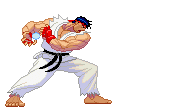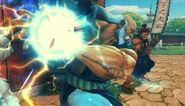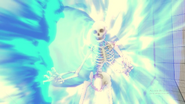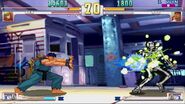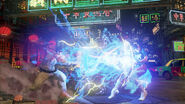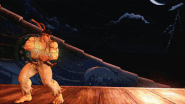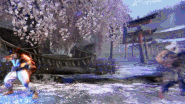- "Concentrated energy...the longer it builds up, the more devastating it becomes!"
- —Ryu in Street Fighter III: 2nd Impact
- "Here I come! Denjin! Hadoken! (いくぞ! 電刃! 波動拳! Iku zo! Denjin! Hadōken!?)"
- —Gouken
The Denjin Hadoken (電刃波動拳 Denjin Hadōken?, "Electric Blade Surge Fist") is a type of Hadoken that was introduced in the Street Fighter III series as Ryu's third Super Art. It also appears as Gouken's second Ultra Combo in the Street Fighter IV series, and as Ryu's Critical Art, if his first V-Trigger is active, in Street Fighter V.
| Appearance | User(s) | Function | Input |
|---|---|---|---|
| Street Fighter III series | Ryu | Super Art III | |
| Street Fighter EX series | Evil Ryu Ace |
Meteor Combo | |
| Street Fighter IV series | Gouken | Ultra Combo II | |
| Street Fighter V | Ryu | Critical Art | |
| Street Fighter 6 | Ryu | Super Art (Level 1) |
| Gouken (SFIV) | 300-540 |
|---|---|
| Ryu (SFV) | 350 |
Description[]
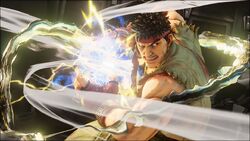
Ryu charging up for Denjin Hadoken.
This Hadoken is particularly unique in the fact that it can be charged to determine the amount of hits, damage and stun it will inflict on the opponent. The charging speed of the attack can be increased by rotating the analog stick.
At its maximum charge, Ryu's Denjin Hadoken inflicts five hits and is guaranteed to stun the opponent. Gouken's Denjin Hadoken inflicts eight hits at maximum charge and a huge amount of stun. It also causes the opponent to bounce off the wall, allowing for juggling combos.
In Capcom vs. SNK 2, Evil Ryu's Metsu Hadoken functions and appears very similarly to the Denjin Hadoken as both are rather small in size, have a magenta-like color, and is sure to stun. However, while the Metsu Hadoken can do the same number of hits as Ryu's Denjin Hadoken, it's overall speed is slow, and it uses up the entire Super Combo meter, leaving not many opportunities to use it.
Since the 2012 patch for Super Street Fighter IV: Arcade Edition, Gouken's Denjin Hadoken is the most powerful Ultra Combo available when fully charged (not counting Makoto's Seichusen Godanzuki combined with Tanden Renki). It is fully charged from the move's outset whenever he is fought in his boss form.
In Street Fighter V, if the Shinku Hadoken Critical Art is used while the Denjin Renki is active, then it becomes the Denjin Hadoken. Unlike the Street Fighter III version, it cannot be charged (Ryu throws it immediately after the activation animation). While it is not unblockable, it cause a guard crush if blocked, which can lead to a follow-up.
In Street Fighter 6, the Shinku Hadoken is replaced by Denjin Hadoken if it's used while Denjin Charge is activated.
Story[]
The technique can't be performed without having mastered the Satsui no Hado, as it uses the energy source as a catalyst. The user combines their own ki with a controlled amount of Satsui no Hadou, with the resulting friction of positive and negative energies producing electric conduction within the projectile.[1]
Tactics[]
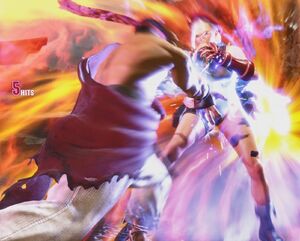
Ryu blasting Cammy with a Denjin Hadoken.
The Denjin Hadoken focuses on strength, requiring strategic timing to be successful, as charging the move too long will leave the user vulnerable to any attack, and releasing it prematurely will allow the opponent to dodge it by jumping over it, parrying or using a move that passes through projectiles.
In Street Fighter III, Denjin Hadoken is completely unblockable, due to the existence of parries offering another form of defense against it. Ryu can set up the attack after a special cancel and charge Denjin Hadoken to put the opponent in a terrifying mix-up scenario. Ryu is able to counter parry attempts either by setting up a Hadoken right before immediately cancelling into Denjin Hadoken or surprise an opponent trying to parry the attack with a Tatsumaki Senpukyaku or low attack to throw off their timing. However, since the attack is punishable on hit and does not knock the opponent down, Ryu must make sure that the opponent is close to being stunned before he attempts to use it. Later games alter these properties due to parrying no longer being a universal mechanic, reducing the overall reward from the attack to compensate.
Trivia[]
- When fully charged, this is the most damaging Ultra Combo in the Street Fighter IV series.
- In Ultra Street Fighter IV, even when fully loaded, Denjin Hadoken can be blocked.
- Originally, Ryu originally meant to have Denjin Hadoken instead of Shin Hadoken included as part of Hado Kakusei exclusive move in the gameplay of Ultimate Marvel vs. Capcom 3, but it was dropped and the sound files were left unused.[citation needed]
- The color of the electricity generated from inside the body is yellow (as seen from Blanka and Laura), while artificial or electricity generated from the outside is blue (C. Viper). Ryu and Gouken utilize both Hadou and electric current when using Denjin Hadoken.[2]
Gallery[]
Sprites[]
Screenshots[]
Gif Animations[]
Video[]
| Gouken's Move List | |
|---|---|
| Unique Attacks | Sakotsukudaki • Tenmakujinkyaku • Shinkai Geri • Joudan Sokutogeri |
| Special Attacks | Gohadoken • Senkugoshoha • Tatsumaki Gorasen • Hyakkishu • Kongoshin • Fudoshin |
| Super Combos | Forbidden Shoryuken |
| Ultra Combos | Shin Shoryuken • Denjin Hadoken |
References[]
- ↑ --Do you have any secret stories about the electric blade Hadoken?
"By alternately inverting the method of mixing the Hado for a short period of time, the Hado can be charged with electricity. This was made possible by controlling the ki of the murderous wave, which has a yin nature, for a short time. Perhaps, If you completely overcome the wave of murderous intent, you will not be able to use the electric blade Hadoken."(電刃波動拳の会得秘話などありますか? 「波動の練り方を、短い間に交互に反転させることで、波動に電気を帯びさせることができる。これは陰の性質を持つ、殺意の波動の気を少しの間、制御することで可能になったものです。おそらく殺意の波動を完全に克服することになれば、電刃波動拳は使えなくなるでしよう」) Ryu's explanation from an interview in Gamest Mook Vol. 81 – Street Fighter III New Generation ‘Fan Book’ page 85. - ↑ Takayuki Nakayama Tweet

